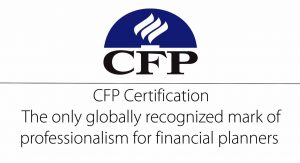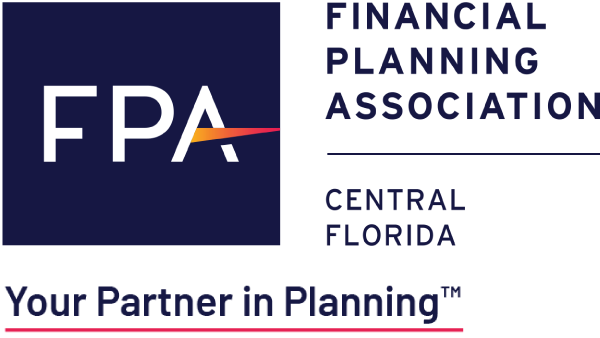
Financial Planner or CERTIFIED FINANCIAL PLANNER™? One Word Can Make a World of Difference
 Martha and Matt have goals. They want to find the time and the money to travel with their kids. They want to better manage their household finances. They want to help pay for their kids to attend college. They want to save enough now to eventually live comfortably in retirement. And they want a financial professional to help them develop a plan that puts them on track to meet their goals.
Martha and Matt have goals. They want to find the time and the money to travel with their kids. They want to better manage their household finances. They want to help pay for their kids to attend college. They want to save enough now to eventually live comfortably in retirement. And they want a financial professional to help them develop a plan that puts them on track to meet their goals.
The couple has narrowed their search to two financial professionals, one who is a CERTIFIED FINANCIAL PLANNER™ professional, or CFP®, and the other who calls himself a “financial planner” but who has not earned the CFP® designation. Both candidates seem experienced and well qualified. Now Martha and Matt are wondering if there are distinctions between the CFP® designation and the generic “financial planner” label, and if so, whether those distinctions matter.
“A lot of people don’t understand there are differences between the two,” says Sallie Mullins Thompson, a CFP® professional who practices in New York City. Yet people like Martha and Matt should be aware of these distinctions, because they can impact the direction of a person’s financial life, their ability to attain their goals, and their overall experience working with a financial professional.
“Anyone can call themselves a financial planner,” notes Richard K. Colarossi, CFP®, of Colarossi & Williams Financial Advisory Group in Islandia, NY. That includes professionals who exclusively sell insurance, provide investment advice or handle stock market investments, for example.
Not everyone can call themselves a CFP® professional, however, explains Harold Evensky, a CERTIFIED FINANCIAL PLANNER™ professional at Evensky & Katz, a wealth management firm in Lubbock, TX. “CERTIFIED FINANCIAL PLANNER™ is a registered trademark indicating the individual has met a series of substantive criteria indicating their professional qualifications to provide unbiased, comprehensive financial planning advice. This is coupled with on-going educational, ethics and practice standards.”
This article, the first in a five-part series on The Power of Financial Planning, highlights 10 key distinctions between a financial planner and a CERTIFIED FINANCIAL PLANNER™, and explains why it's important for consumers to be aware of the differences.
- CERTIFIED FINANCIAL PLANNER™ professionals are held to a fiduciary standard. That means they are obligated under the terms of their CFP® designation to always put the interests of their clients first, above their own interests and those of their firm or the company (or companies) whose products and services they represent.
Professionals who aren’t subject to a fiduciary requirement instead may do business under a less stringent set of requirements called a suitability standard, which requires them to recommend products that are “suitable” to the client — that is, that the recommended security or product fit the client’s investing objectives, needs and circumstances.
Most financial professionals who work under a suitability standard are regulated by the independent body FINRA. And there are grey areas in that standard. For example, a financial professional to whom only the suitability standard applies may recommend a suitable product that happens to carry a higher cost to the consumer and a higher sales commission for the financial professional, instead of a nearly identical but lower-cost, lower-commission product. The adviser opted for one suitable product because of the opportunity to earn a higher commission, even though another, more suitable (less costly) product for the client was available.
When evaluating products that are identical except for their fees, a fiduciary is obligated to recommend the lowest-cost product to the client, even if it means a lower commission in the fiduciary’s pocket. A financial professional who’s working under a suitability standard may opt to recommend a higher-cost product, because their interests may lie first with the firm and/or the company whose products they’re recommending and selling.
The distinction is important, and one that can make a material financial difference to the consumer, as the money an investor pays in fees could instead have gone toward the investment, where it would have the opportunity to grow over time. This can mean hundreds, even thousands, of dollars of appreciated investment value time.
- CERTIFIED FINANCIAL PLANNER™ professionals must adhere to a code of ethics that governs their behavior, priorities, etc. The CFP Board, the governing body that oversees all CERTIFIED FINANCIAL PLANNER™ programs, requires that CFP® professionals follow a Code of Ethics in all their professional activities, including interactions with clients. The code includes seven principles:
- Principle 1 – Integrity: Honesty and candor must not be subordinated to personal gain or advantage.
- Principle 2 – Objectivity: Regardless of the service they’re providing or the capacity in which they are functioning, CFP® professionals must maintain objectivity and avoid subordination of their judgment.
- Principle 3 – Competence: CFP® professionals must attain and maintain an adequate level of knowledge and skill, and apply that knowledge and skill in providing services to clients.
- Principle 4 – Fairness: This requires CFP® professionals to act with impartiality and intellectual honesty, and to disclose any material conflict of interest.
- Principle 5 – Confidentiality: Ensure that client information is accessible only to those authorized to have access.
- Principle 6 – Professionalism: Behaving with dignity and courtesy to clients, fellow professionals and others in business-related activities.
- Principle 7 – Diligence: Provide services in a reasonably prompt and thorough manner.
- CFP® professionals are trained and have demonstrated competency in multiple areas of finance. To earn their designation, CFP® professionals must complete a comprehensive course of study offered by a college or university program that follows a personal financial planning curriculum approved by the CFP Board. That course of study encompasses more than 100 topics in stocks, bonds, taxes, insurance, retirement planning and estate planning. In addition, they must have earned a bachelor's degree from a regionally accredited college or university.
Standing behind the CFP® designation is a governing body, the Certified Financial Planner Board of Standards Inc., that administers the national CFP® exam, sets continuing education requirements and enforces rules and requirements to ensure CFP® practitioners live up to the standards of the designation. The requirements for CFP® certificants are constantly being reviewed, evaluated and updated by the Certified Financial Planner Board of Standards, which is expected to issue a new code of standards in the Spring of 2018.
- CFP® professionals emphasize plan over product. Ever felt like you were being sold a product by someone who never really made an effort to determine whether that product was the right fit for you? CFP® professionals are trained to look thoroughly at a client’s circumstances, goals, needs and priorities, then to build a plan around those. Any product recommendations they make to clients must fit in the overall context of that financial plan. That plan then is regularly monitored, revisited and fine-tuned as necessary.
On the other hand, a financial professional who lacks the CFP® marks “might get paid more for selling certain products, regardless of how well these fit inside an overall plan,” notes Geoffrey H. Owen, a CFP® practitioner with GreerWalker in Charlotte, NC. “Unfortunately, for many it is a guise, as they continue to be product salesmen or investment brokers without any real skillset or desire to engage in bona fide planning for their clients.”
- CFP® professionals must disclose how they are paid. It’s not always clear how a financial professional makes money, because they aren’t always up-front about the fees, commissions and other costs they charge customers. The priority for CERTIFIED FINANCIAL PLANNER™ practitioners is to be completely transparent and forthcoming about how they are compensated. They are required to make certain oral and/or written disclosures at certain times during their interactions with clients and prospects.
- CFP® professionals see and address the entire picture, not just part of it. They’re trained to synthesize every aspect of a person’s financial life into a coherent, orchestrated plan, something that financial professionals with a narrower focus may not have the education or the expertise to do. A person who calls themselves a “financial planner” in reality may only be qualified to handle a segment of a person’s overall financial needs — insurance, for example, or investments.
CERTIFIED FINANCIAL PLANNER™ professionals, on the other hand, are trained in:
- Financial statement preparation and analysis, including cash flow analysis/planning and budgeting.
- Insurance planning and risk management.
- Employee benefits planning.
- Investment planning.
- Tax planning.
- Retirement planning.
- Estate planning/wealth transfer.
7. CFP® professionals must follow a prescribed process when working with their clients. Other financial professionals may have no such requirement. The process CFP® practitioners are required to follow includes six steps:
-
- Establishing and defining the client-planner relationship.
- Gathering client data, including goals.
- Analyzing and evaluating the client’s current financial status and their assets.
- Developing and presenting recommendations and/or alternatives.
- Implementing the recommendations.
- Monitoring the recommendations and updating the plan as needed.
8. Due diligence is part of the job description. CFP® professionals are trained to perform a complete data-gathering process with all their clients, allowing them to see the big picture before making any recommendations to the client. Other financial professionals may or may not follow as thorough a process.
9. Continuing education is required. CFP® practitioners must take continuing education courses, annually, on topics specifically related to financial planning. This helps them stay abreast of the latest tactics, technologies and practices to benefit their clients.
10. CFP® professionals are inclined to work with other advisers as part of a team. When a client’s situation calls for specialized expertise, a CFP® practitioner is trained to seek out other professionals to meet the client’s needs. Under the CFP Code of Ethics, CFP® professionals are required to recognize “when consultation with other professionals is appropriate or referral to other professionals [is] necessary,” and to act accordingly.
Ultimately, “people deserve to know more about the people they are trusting with their hard-earned money,” says Jon L. Ten Haagen, CFP®, of Ten Haagen Financial Group in Huntington, NY. With an understanding of what sets a CERTIFIED FINANCIAL PLANNER™ professional apart from the crowd, they’re more likely to get the quality financial guidance they deserve.
To find a CFP® professional in your area, visit the Financial Planning Association’s searchable database at www.PlannerSearch.org.

